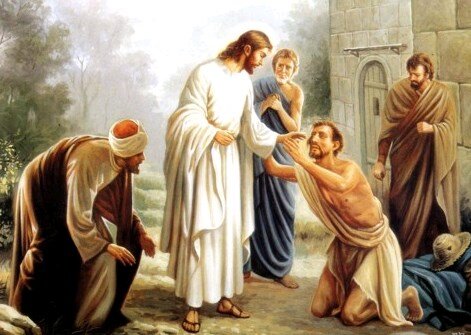Fourth Sunday of Lent March 19, 2023
Readings: 1 Samuel 16:1b, 6-7, 10-13a; Ephesians 5:8-14; John 9, 1-41
Amazing grace, how sweet the sound,
That saved a wretch like me!
I once was lost, but now I'm found;
Was blind, but now I see.
it was written by John Newton, who was part of the revival of the Church of England in the late eighteenth century. He was a self-educated man, who had gone to sea and at one time had been the captain of a ship in the African slave trade. After his conversion, he became an ordained minister of the Church of England, finally serving as rector of a church in London. It could well be that this personal testimony referred to his time of blindness to the awful exploitation and forced transport of the wretched slaves. He was indeed a spiritual wretch, just as the slaves were physical wretches in the stinking hold of his ship. Through an amazing grace his eyes were opened and he could see clearly God's will for his life, and it was not to haul slaves.
Today's gospel centres on the analogy and distinction between physical and spiritual blindness, as do most of the Gospel miracle stories where Jesus heals blind people. The early Christians saw physical blindness as a metaphor for the spiritual blindness which prevents people from recognizing and coming to Jesus. These stories testify, therefore, to the power of Jesus to heal not just the blindness of the eye but, above all, the blindness of the heart.
In the first reading from the Book of Samuel we have the story of Samuel journeying to the house of Jesse for choosing the successor of King Saul. Samuel thought that the chosen one was Eliab, because he was the eldest, the tallest and the most handsome of all the sons of Jesse. But the Lord rejected Eliab and all the seven sons presented as worthy candidates to him. “God does not see as man sees; man looks at appearances but God looks at the heart.” Finally, the youngest son David arrives, he is not handsome and lacks experience but he has a good heart. David is anointed King because God goes beyond appearances and sees David as the shepherd King of his people.
The inner dynamic of the story of the gospel shows the blind man in the process of coming to sight and faith in the son of man, while at the same time the Jewish leaders move towards blindness. Jesus sets the tone for the story by indicating that the man was born blind so the works of God may be made visible through him. Through this passage John presents Jesus as the light of the world. This passage forms the second of the three Baptismal themes given to us during lent namely, light consisting of giving vision to the blind man, the others being water, with the woman at the well and life, with the raising of Lazarus from the dead. These powerful readings remind those preparing for baptism, as well as all those baptized, what this baptismal life is all about. In the Gospel we see here the drama of the will to accept or reject the call of Christ. The man born blind receives his physical sight early in the story, but the rest of the episode traces the birth of his spiritual sight.
Although the healing of the physical blindness of the person and his reduction of physical suffering was instantaneous, his growth in spiritual sight was gradual. He grew from his vague perception of the saviour as the man called Jesus to boldly proclaiming that Jesus is a prophet and finally turning his back on his lack of parental support and the hostility of religious leadership to recognize Jesus whom he had never actually seen face to face, as the Lord whom he worshipped. Again while the blind man came to see the persons who were able to see physically became blinder. The self-centeredness, hardness of the heart of Pharisees made them more blind, a quality of persons who have not really experienced real suffering.
We are told, especially in today’s society, that seeing is
believing. God isn’t a person; we can’t see him, but he gives us people,
situations, or other symbols in our everyday lives that represent his presence
in our lives. Much like the Pharisees,
we often struggle to see these blessings and recognize that they are a sign of
God’s presence in our life. Let us not be like the Pharisees who remained proud
and were left blind though they had the physical eyes. Let us follow the example of the blind man who
by God’s grace was given his sight and then stuck to the truth regardless of
the consequences, and who by his humility was receptive to the revelation of
Jesus Christ he was given. He was healed physically and spiritually.
May we pray during this Lenten season for God to help us see
him in our everyday lives, and that we may be God to others in little ways
every day.
Happy Sunday


No comments:
Post a Comment